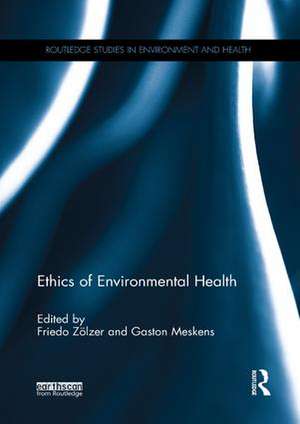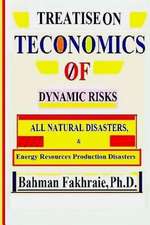Ethics of Environmental Health: Routledge Studies in Environment and Health
Editat de Friedo Zölzer, Gaston Meskensen Limba Engleză Paperback – 17 ian 2019
How can we determine the "acceptable" risk level for the general population or for certain groups? How should we deal with uneven distributions of risks and benefits? How do we communicate about risks with the stakeholders? This multidisciplinary collection brings together a number of leading researchers and scholars in order to generate discussion surrounding these key questions, and to bring the ethical implications of science and technology to the forefront of critical thought.
Providing a broad overview of the Ethics of Environmental Health, its philosophical foundations and practical applications, this book offers a significant contribution to ongoing discussions in sustainable development and will be of interest to scholars and practitioners of Environmental Health, urban studies and healthcare.
| Toate formatele și edițiile | Preț | Express |
|---|---|---|
| Paperback (1) | 411.26 lei 6-8 săpt. | |
| Taylor & Francis – 17 ian 2019 | 411.26 lei 6-8 săpt. | |
| Hardback (1) | 998.71 lei 6-8 săpt. | |
| Taylor & Francis – 24 apr 2017 | 998.71 lei 6-8 săpt. |
Preț: 411.26 lei
Nou
Puncte Express: 617
Preț estimativ în valută:
78.70€ • 82.06$ • 65.41£
78.70€ • 82.06$ • 65.41£
Carte tipărită la comandă
Livrare economică 20 martie-03 aprilie
Preluare comenzi: 021 569.72.76
Specificații
ISBN-13: 9780367152260
ISBN-10: 0367152266
Pagini: 182
Ilustrații: 11 Line drawings, black and white
Dimensiuni: 174 x 246 x 11 mm
Greutate: 0.34 kg
Ediția:1
Editura: Taylor & Francis
Colecția Routledge
Seria Routledge Studies in Environment and Health
Locul publicării:Oxford, United Kingdom
ISBN-10: 0367152266
Pagini: 182
Ilustrații: 11 Line drawings, black and white
Dimensiuni: 174 x 246 x 11 mm
Greutate: 0.34 kg
Ediția:1
Editura: Taylor & Francis
Colecția Routledge
Seria Routledge Studies in Environment and Health
Locul publicării:Oxford, United Kingdom
Public țintă
PostgraduateCuprins
Foreword
Henk ten Have, Director, Pittsburgh, USA
former Director, Division of Ethics of Science and Technology, UNESCO
Part I. Insights from the Discussion of Related Topics
Global, Regional and Local Ecological Change:
Ethical Aspects for Public Health Research and PracticeColin L. Soskolne, Edmonton, Alberta, Canada
Environmental Ethics and Environmental PoliciesMarie Claire Cantone, Milan, Italy
Justice, Environmental Health Laws and Relations Between People
Carl Cranor, Riverside, California, USA
Part II. Principles
A Common Morality Approach to Environmental Health Ethics
Friedo Zölzer, České Budějovice, Czech Republic
Bioethics, the Precautionary Principle, and Future Generations
Robin Attfield, Cardiff, UK
Recent Reflections on the Ethical Basis of the System of Radiological ProtectionChristopher Clement, Ottawa, Ontario, Canada
Part III. Decision Making on Environmental Health Problems
The Phenomenology of Environmental Health Risk: Vulnerability to Modern Technological Risk, Alienation, and Risk Politics
Mark Coeckelbergh, Leicester, UK
Taking Public Opinion Serious in Post-Fukushima JapanMichio Miyasaka, Niigata, Japan
Better Living (in a Complex World) - An Ethics of Care for our Modern Co-Existence
Gaston Meskens, Mol, Belgium
Part IV: Ethics of Radiological Protection
Considerations on Medical Radiation UsageJürgen Kiefer, Giessen, Germany
Social and Ethical Issues in RemediationDeborah Oughton, As, Norway
Radioactive Waste: Some Ethical Aspects of its Disposal
Christian Streffer, Essen, Germany
Conclusions and recommendations
Henk ten Have, Director, Pittsburgh, USA
former Director, Division of Ethics of Science and Technology, UNESCO
Part I. Insights from the Discussion of Related Topics
Global, Regional and Local Ecological Change:
Ethical Aspects for Public Health Research and PracticeColin L. Soskolne, Edmonton, Alberta, Canada
Environmental Ethics and Environmental PoliciesMarie Claire Cantone, Milan, Italy
Justice, Environmental Health Laws and Relations Between People
Carl Cranor, Riverside, California, USA
Part II. Principles
A Common Morality Approach to Environmental Health Ethics
Friedo Zölzer, České Budějovice, Czech Republic
Bioethics, the Precautionary Principle, and Future Generations
Robin Attfield, Cardiff, UK
Recent Reflections on the Ethical Basis of the System of Radiological ProtectionChristopher Clement, Ottawa, Ontario, Canada
Part III. Decision Making on Environmental Health Problems
The Phenomenology of Environmental Health Risk: Vulnerability to Modern Technological Risk, Alienation, and Risk Politics
Mark Coeckelbergh, Leicester, UK
Taking Public Opinion Serious in Post-Fukushima JapanMichio Miyasaka, Niigata, Japan
Better Living (in a Complex World) - An Ethics of Care for our Modern Co-Existence
Gaston Meskens, Mol, Belgium
Part IV: Ethics of Radiological Protection
Considerations on Medical Radiation UsageJürgen Kiefer, Giessen, Germany
Social and Ethical Issues in RemediationDeborah Oughton, As, Norway
Radioactive Waste: Some Ethical Aspects of its Disposal
Christian Streffer, Essen, Germany
Conclusions and recommendations
Recenzii
Ethics of Environmental Health makes a valuable and unique contribution to the emerging field of environmental health ethics. The book includes papers discussing important aspects of environmental health ethics, including risk assessment, precaution, distribution of health risks, ethical decision-making, and global and local issues. I recommend it highly.
David B. Resnik, National Institute for Environmental Health Sciences, Research Triangle Park, USA
The International Commission on Radiological Protection has long recognised the importance of ethics for the system of radiological protection. We are delighted to have played an active role in the completion of this book project and to give it our full endorsement.
Dr Claire Cousins, Chair of the International Commission on Radiological Protection
Important environmental health determinants go unacknowledged in policy and law. This volume discusses a number of these, intending to inspire a return to the awareness of the harms we condone, neglect, or allow others to perpetrate with impunity when we ignore the ethical dimensions of health research, policy and law.
Laura Westra, University of Windsor, Ontario, Canada (Founder and Leader of the Global Ecological Integrity Group)
David B. Resnik, National Institute for Environmental Health Sciences, Research Triangle Park, USA
The International Commission on Radiological Protection has long recognised the importance of ethics for the system of radiological protection. We are delighted to have played an active role in the completion of this book project and to give it our full endorsement.
Dr Claire Cousins, Chair of the International Commission on Radiological Protection
Important environmental health determinants go unacknowledged in policy and law. This volume discusses a number of these, intending to inspire a return to the awareness of the harms we condone, neglect, or allow others to perpetrate with impunity when we ignore the ethical dimensions of health research, policy and law.
Laura Westra, University of Windsor, Ontario, Canada (Founder and Leader of the Global Ecological Integrity Group)
Descriere
Environmental health encompasses the assessment and control of those environmental factors that can potentially affect human health, such as radiation, toxic chemicals and other hazardous agents. It is often assumed that the assessment part is just a matter of scientific research, and the control part a matter of implementing standards which unambiguously follow from that research. But it is less commonly understood that environmental health also requires addressing questions of an ethical nature.
How can we determine the "acceptable" risk level for the general population or for certain groups? How should we deal with uneven distributions of risks and benefits? How do we communicate about risks with the stakeholders? This multidisciplinary collection brings together a number of leading researchers and scholars in order to generate discussion surrounding these key questions, and to bring the ethical implications of science and technology to the forefront of critical thought.
Providing a broad overview of the Ethics of Environmental Health, its philosophical foundations and practical applications, this book offers a significant contribution to ongoing discussions in sustainable development and will be of interest to scholars and practitioners of Environmental Health, urban studies and healthcare.
How can we determine the "acceptable" risk level for the general population or for certain groups? How should we deal with uneven distributions of risks and benefits? How do we communicate about risks with the stakeholders? This multidisciplinary collection brings together a number of leading researchers and scholars in order to generate discussion surrounding these key questions, and to bring the ethical implications of science and technology to the forefront of critical thought.
Providing a broad overview of the Ethics of Environmental Health, its philosophical foundations and practical applications, this book offers a significant contribution to ongoing discussions in sustainable development and will be of interest to scholars and practitioners of Environmental Health, urban studies and healthcare.



























